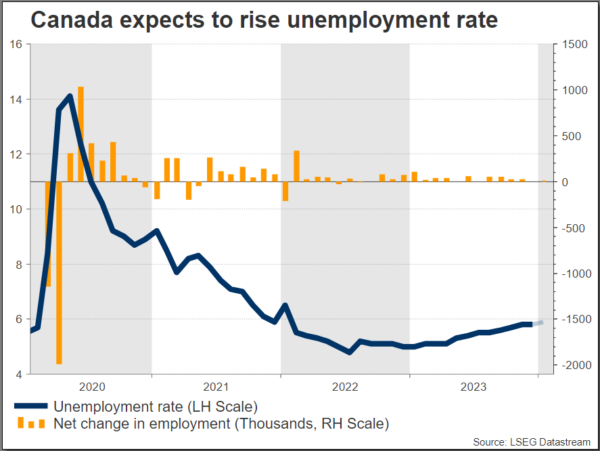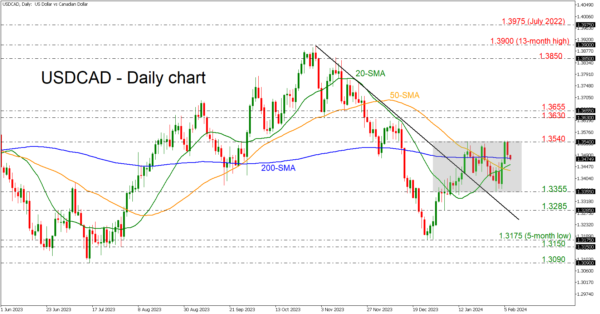- Canada’s economy likely added more jobs in January
- Ivey PMIs rises to its highest level in 9 months
- BoC summary of deliberations gets releasedon Wednesday
- Loonie rises ahead of Friday’s data due at 13:30 GMT
In Canada, a number of data releases are scheduled for this week. On Tuesday, the Ivey Purchasing Managers’ Index (PMIs) came out, which will be followed by the summary of deliberations from the most recent Bank of Canada meeting on Wednesday. The report is analogous to the meeting minutes and will provide investors with a comprehensive record of the discussions that took place on January 24. On Friday, the employment data for January will determine if the upward trajectory of the jobless rate persists.
BoC’s Macklem speaks ahead of BoC summary of deliberations
Tiff Macklem, the Governor of the Bank of Canada, is defining the boundaries of monetary policy by cautioning that the central bank cannot address issues like housing affordability through adjustments in interest rates.
In his prepared remarks delivered in Montreal on Tuesday, Macklem asserts that historical evidence demonstrates the considerable efficacy of monetary policy in managing inflation over the medium term. However, the governor acknowledges that the system also has constraints, such as its incapacity to tackle immediate price changes.
As most people expected, the Bank of Canada kept the goal for its overnight rate at 5% for the fourth time in a row in January. This meant that the cost of borrowing money was at its highest level in 22 years. The Governing Council said that it is still worried about the risks to the outlook of inflation, especially the risks to underlying price growth after preferred core inflation gauges unexpectedly rose in December.
This means that tight monetary policy will stay in place. Headline inflation is expected to stay around 3% for the first half of the year, according to the central bank. It will then start to drop to the 2% goal in 2025. Even though tight policy has caused the economy to slow down, interest rates have stayed high. The Bank said that consumers have cut back on spending, business investment has decreased, and job market conditions have become more balanced.
Ivey PMIs hit highest level since April
According to Tuesday’s Ivey Purchasing Managers Index (PMI) statistics, economic activity in Canada accelerated in January to its fastest pace in nine months.
The seasonally adjusted index rose from 56.3 in December to 56.5 in January, reaching its highest point since April. The Ivey PMI is a monthly indicator that tracks economic activity as reported by a group of Canadian purchasing managers. An increase in activity is indicated by a value above 50.
Canada’s unemployment rate expected to tick up
In December 2023, Canada’s jobless rate stayed at 5.8%, the same as the 22-month high recorded the previous month. It was a little lower than the forecast of 5.9%, but it’s expected to rise to 5.9% in January.
Notably, the indicator has exhibited a gradual upward trend since April, and a continuation in this direction could bolster demands for earlier reductions in borrowing costs.
Canada’s employment level went up by 0.1k in December, after going up by 24.9k in November. This was less than the 13.5k growth that was expected. Based on this month’s report, it is expected to add 15.0K jobs in January.
 USDCAD loses ground in sideways channel
USDCAD loses ground in sideways channel
If the data indicates a slowdown in the economy, it is possible that USDCAD will stay above its simple moving averages (SMAs), which have been limiting upward movements around the 1.3400 level. More precisely, if the price surpasses the current resistance level of 1.3540, which is currently operating as the upper boundary of a short-term consolidation range between 1.3355 and 1.3540, it might potentially reach the restrictive zone of 1.3630-1.3655.
If the bears manage to push the price below the 1.3355 support level, selling pressure might increase below the 1.3285 area, approaching the five-month low of 1.3175.

